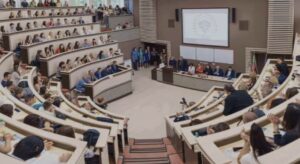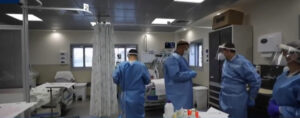欧州の医学部入試問題を実際に解く:生物・化学の問題と解説 ⑷

はじめに
今日は化学の世界に足を踏み入れ、海外医科大学で実際に出題された興味深い問題に挑戦してみましょう。化学は目に見えない微細な世界での出来事を理解するための鍵となる学問です。それでは、さっそく問題を解いてみましょう。化学反応の基本的な概念や法則の理解が重要ですよ。反応式を正しく書けること、そして物質の性質や状態変化を把握していることは、問題解決の基礎となりますね。

実践問題
Understanding Isomerism and Hybridization in Organic Chemistry.
Question 1
Which pair of compounds are isomers?
- a) CH₃CH₂CH₂CH₃ and CH₃CH₂CH₃
- b) CH₃CH₂CH₂CH₃ and CH₃C(CH₃)₂CH₃
- c) CH₃CH₂CH₂CH₃ and CH₃C(CH₃)₂
- d) CH₃CH₂CH₂CH₃ and CH₃CH₂CH₂CH₂CH₃
Question 2
What is the hybridization state of the carbon atom in methane?
- a) Non-hybridized
- b) sp hybridized
- c) sp² hybridized
- d) sp³ hybridized
問題の解答解説(英語&日本語)
Question 1
Correct Answer: c) CH₃CH₂CH₂CH₃ and CH₃C(CH₃)₂
In organic chemistry, isomers are compounds that share the same molecular formula but have different structural arrangements. Let’s analyze each pair provided in the question
- a) CH₃CH₂CH₂CH₃ (butane, C₄H₁₀) and CH₃CH₂CH₃ (propane, C₃H₈):Different molecular formulas, so not isomers.
- b) CH₃CH₂CH₂CH₃ (butane, C₄H₁₀) and CH₃C(CH₃)₂CH₃ (2,2-dimethylpropane or neopentane, C₅H₁₂):Different molecular formulas, so not isomers.
- c) CH₃CH₂CH₂CH₃ (butane, C₄H₁₀) and CH₃C(CH₃)₂ (isobutane or 2-methylpropane, C₄H₁₀):Same molecular formula with different structures, so they are isomers.
- d) CH₃CH₂CH₂CH₃ (butane, C₄H₁₀) and CH₃CH₂CH₂CH₂CH₃ (pentane, C₅H₁₂):Different molecular formulas, so not isomers.
Structure Explanation: The latter compound, CH₃C(CH₃)₂, is known as 2-methylpropane. It features a central carbon atom bonded to three methyl groups, making it a branched structure. Both compounds possess the same molecular formula, C₄H₁₀, but differ in their structural configurations, thus qualifying them as structural isomers.
Question 1 – 日本語での解説:どのペアが異性体か?
正解: c) CH₃CH₂CH₂CH₃(ブタン)と CH₃C(CH₃)₂(イソブタン)
異性体(isomers)とは、分子式は同じだが構造が異なる化合物です。各選択肢を分析しましょう。
- a) CH₃CH₂CH₂CH₃(ブタン、C₄H₁₀)と CH₃CH₂CH₃(プロパン、C₃H₈)
- ブタン: C₄H₁₀
- プロパン: C₃H₈
- 分子式が異なるため、異性体ではありません。
- b) CH₃CH₂CH₂CH₃(ブタン、C₄H₁₀)と CH₃C(CH₃)₂CH₃(ネオペンタン、C₅H₁₂)
- ブタン: C₄H₁₀
- ネオペンタン: C₅H₁₂
- 分子式が異なるため、異性体ではありません。
- c) CH₃CH₂CH₂CH₃(ブタン、C₄H₁₀)と CH₃C(CH₃)₂(イソブタン、C₄H₁₀)
- ブタン: C₄H₁₀
- イソブタン: C₄H₁₀
- 同じ分子式で構造が異なるため、これらは構造異性体です。
- d) CH₃CH₂CH₂CH₃(ブタン、C₄H₁₀)と CH₃CH₂CH₂CH₂CH₃(ペンタン、C₅H₁₂)
- ブタン: C₄H₁₀
- ペンタン: C₅H₁₂
- 分子式が異なるため、異性体ではありません。
<解説>
CH₃C(CH₃)₂ はイソブタン(2-メチルプロパン)という化合物です。 この構造について、以下に解説します。
- 中央の炭素原子(C)に3つのメチル基(CH₃)が結合しています。
- つまり、1つの炭素原子に3つのメチル基が付いた構造です。
この表記は少し省略されていますが、完全に書くと CH₃CH(CH₃)CH₃となります。中央の炭素には実際には水素も1つ結合しています。
イソブタンは分岐した構造を持つアルカンで、直鎖状のn-ブタン(CH₃CH₂CH₂CH₃)の異性体です。両方とも分子式は C₄H₁₀ ですが、原子の配置が異なります。
n‐ブタン(IUPAC名は単にブタン) CH₃CH₂CH₂CH₃は正ブタンとも呼ばれ,沸点-0.50℃,イソブタン(IUPAC名は2‐メチルプロパン) CH₃-C(CH₃)₂-Hは分枝状アルカンの最も簡単なもので,沸点-11.73℃である。天然ガスの一成分として産し,また原油中に溶存し,石油精製における蒸留ガスに含まれる。
Question 2
Correct Answer: d) sp³ hybridized
In methane (CH₄), the carbon atom forms four sigma (σ) bonds with hydrogen atoms, leading to a tetrahedral geometry. The question prompts for the hybridization state of carbon in methane
- a) Non-hybridized:Incorrect. The carbon atom undergoes hybridization to form bonds.
- b) sp hybridized:Incorrect. This hybridization occurs in linear geometries.
- c) sp² hybridized:Incorrect. This applies to trigonal planar geometries found in compounds like ethylene.
- d) sp³ hybridized:Correct. The carbon atom in methane forms four equivalent sp³ hybrid orbitals, resulting in a tetrahedral structure.
Question 2 – 日本語での解説:メタンの炭素原子の混成軌道は?
正解: d) sp³混成(sp³ hybridized)
メタン(CH₄)では、炭素原子は4つの水素原子と単結合を形成しています。この結合を形成するため、炭素原子の軌道は混成化します。
- a) 非混成(non hybridized)
- 不正解:メタンの炭素は混成軌道を形成しています。
- b) sp混成(sp hybridized)
- 不正解:sp混成は直線構造(例:アセチレン)に見られます。
- c) sp²混成(sp² hybridized)
- 不正解:sp²混成は平面三角形構造(例:エチレン)に見られます。
- d) sp³混成(sp³ hybridized)
- 正解:メタンの炭素原子はsp³混成軌道を形成し、4つの水素原子と結合して正四面体構造を作ります。
まとめ:Summary of Concepts
- Isomers possess the same molecular formula but different structures, leading to distinct chemical properties. In the analysis, pair c) is identified as isomers: butane and isobutane.
- Hybridization of carbon in methane demonstrates the formation of sigma bonds and tetrahedral geometry, classifying it as sp³ hybridized.
練習問題
Practice 1
Which of the following pairs represents constitutional isomers?
- a) CH₃CH₂OH (ethanol) and CH₃OCH₃ (dimethyl ether)
- b) CH₃CH₂Cl (chloroethane) and CH₃CH₂CH₃ (propane)
- c) CH₃COOH (acetic acid) and HCOOCH₃ (methyl formate)
- d) CH₃CHO (acetaldehyde) and CH₃OH (methanol)
Practice 2
What is the hybridization state of the carbon atom in ethyne (HC≡CH)?
- a) sp
- b) sp²
- c) sp³
- d) sp³d
Practice 3
Which pair represents geometric isomers?
- a) 1-butene and 2-butene
- b) cis-2-butene and trans-2-butene
- c) propene and cyclopropane
- d) 2-butene and 2-methylpropene
Practice 4
The carbon atom in carbon dioxide (CO₂) exhibits which type of hybridization?
- a) sp
- b) sp²
- c) sp³
- d) unhybridized
Practice 5
Which of the following pairs are structural isomers?
- a) Propanone (acetone) and propanal
- b) Butane and 2-methylpropane
- c) Ethanol and acetic acid
- d) Pentane and hexane
Practice 6
What is the hybridization state of the oxygen atom in water (H₂O)?
- a) sp
- b) sp²
- c) sp³
- d) unhybridized
Practice 7
Which of these compounds are NOT isomers of C₃H₆O?
- a) Propanal
- b) Propanone (acetone)
- c) Cyclopropanol
- d) Propanoic acid
Practice 8
The hybridization of the central carbon atom in 1,3-butadiene (CH₂=CH-CH=CH₂) is:
- a) sp
- b) sp²
- c) sp³
- d) Mixed hybridization
Practice 9
Which pair represents optical isomers?
- a) 2-butanol and 2-methyl-2-propanol
- b) 2-butanol and 1-butanol
- c) (R)-2-butanol and (S)-2-butanol
- d) Butanal and butanone
Practice 10
What is the hybridization of the nitrogen atom in pyridine (C₅H₅N)?
- a) sp
- b) sp²
- c) sp³
- d) dsp²
Explore these concepts further in our organic chemistry curriculum and strengthen your understanding!
©️ 2025 宮下隼也 M.D.










